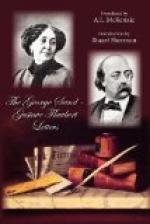“Ah, dear good master, if you could only hate! That is what you lack, hate. In spite of your great Sphinx eyes, you have seen the world through a golden colour. That comes from the sun in your heart; but so many shadows have risen that now you are not recognizing things any more. Come now! Cry out! Thunder! Take your great lyre and touch the brazen string: the monsters will flee. Bedew us with drops of the blood of wounded Themis.”
That summons roused the citadel, but not to surrender, not to betrayal. The eloquent daughter of the people caught up her great lyre—in the public Reponse a un ami of October 3, 1871. But her fingers passed lightly over the “brazen string” to pluck again with old power the resonant golden notes. Her reply, with its direct retorts to Flaubert, is not perhaps a very closely reasoned argument. In making the extract I have altered somewhat the order of the sentences:
“And what, you want me to stop loving? You want me to say that I have been mistaken all my life, that humanity is contemptible, hateful, that it always has been and always will be so? ... What, then, do you want me to do, so as to isolate myself from my kind, from my compatriots, from the great family in whose bosom my own family is only one ear of corn in the terrestrial field? ... But it is impossible, and your steady reason puts up with the most unreasonable of Utopias. In what Eden, in what fantastic Eldorado will you hide your family, your little group of friends, your intimate happiness, so that the lacerations of the social state and the disasters of the country shall not reach them? ... In vain you are prudent and withdraw, your refuge will be invaded in its turn, and in perishing with human civilization you will be no greater a philosopher for not having loved, than those who threw themselves into the flood to save some debris of humanity. ... The people, you say! The people is yourself and myself. It would be useless to deny it. There are not two races. ... No, no, people do not isolate themselves, the ties of blood are not broken, people do not curse or scorn their kind. Humanity is not a vain word. Our life is composed of love, and not to love is to cease to live.”
This is, if you please, an effusion of sentiment, a chant of faith. In a world more and more given to judging trees by their fruits, we should err if we dismissed this sentiment, this faith, too lightly. Flaubert may have been a better disputant; he had a talent for writing. George Sand may have chosen her side with a truer instinct; she had a genius for living. This faith of hers sustained well the shocks of many long years, and this sentiment made life sweet.
STUART P. SHERMAN
I. TO GEORGE SAND 1863
Dear Madam,
I am not grateful to you for having performed what you call a duty. The goodness of your heart has touched me and your sympathy has made me proud. That is the whole of it.




